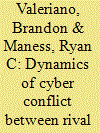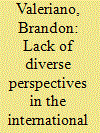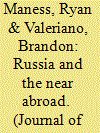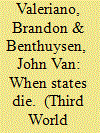|
|
|
Sort Order |
|
|
|
Items / Page
|
|
|
|
|
|
|
| Srl | Item |
| 1 |
ID:
148153


|
|
|
|
|
| Summary/Abstract |
The goal of this article is to engage the concept of rivalry, analyze its possible deficiencies, and empirically identify which groups of states make up what we call complex rivals. A complex rivalry is defined as a group of at least three states whose relationships are linked by common issues, alignments, or dispute joiner dynamics in which there is a threat of militarized conflict and includes persistent long-term interactions and collective animosity. Once the cases that make up complex rivals are described, we examine the dynamics of conflict within complex rivalries. We show that complex rivals tend to follow a different path to war when compared to dyadic rivals in that they experience more war on average, are more likely to include major powers, and fight predominately over positional as opposed to spatial concerns.
|
|
|
|
|
|
|
|
|
|
|
|
|
|
|
|
| 2 |
ID:
132349


|
|
|
|
|
| Publication |
2014.
|
| Summary/Abstract |
Much discussion of the concept of cyberwar, cyber conflict, and the changing dynamic of future security interactions is founded upon the study of what could be, conjured through spectacular flights of the imagination. The goal of this research article is to exhaustively collect information on cyber interactions between rival states in the last decade so that we can delineate the patterns of cyber conflict as reflected by evidence at the international level. The field of cyber security needs a clear return to social science in order to be able to definitively engage the cyber debate with facts, figures, and theory. To that end we provide a dataset of cyber incidents and cyber disputes that spans from 2001 to 2011. Our data include 110 cyber incidents and 45 cyber disputes. Further, we test our theory of cyber conflict which argues that restraint and regionalism should be expected, counter-intuitive to conventional wisdom. We find here that the actual magnitude and pace of cyber disputes among rivals does not match with popular perception; 20 of 126 active rivals engaged in cyber conflict. The interactions that are uncovered are limited in terms of magnitude and frequency suggesting cyber restraint. Further, most of the cyber disputes that are uncovered are regional in tone, defying the unbounded nature of cyberpower. The coming era of cyber conflict may continue to exhibit these patterns despite fears mentioned in the discourse by the media and cyber security professionals.
|
|
|
|
|
|
|
|
|
|
|
|
|
|
|
|
| 3 |
ID:
165099


|
|
|
|
|
| Summary/Abstract |
How states employ coercion to achieve a position of advantage relative to their rivals is changing. Cyber operations have become a modern manifestation of political warfare. This paper provides a portrait of how a leading cyber actor, Russia, uses the digital domain to disrupt, spy, and degrade. The case illustrates the changing character of power and coercion in the twenty-first century. As a contribution to this special issue on twenty-first century military strategy, the findings suggest new forms of competition short of war.
|
|
|
|
|
|
|
|
|
|
|
|
|
|
|
|
| 4 |
ID:
096696


|
|
|
|
|
| Publication |
2010.
|
| Summary/Abstract |
This article takes a closer look at multiparty wars in the modern state system. Because wars are different, a classification system of interstate wars is useful for theoretical concerns and empirical testing. We label multiparty wars "complex" because we believe that the processes that bring them about are much more complicated and difficult to understand than dyadic wars. Complex wars are identified and classified on the basis of their size, the issue that gives rise to them, and whether they are preceded by certain behavioral processes. To see if the classification is empirically useful, a set of empirical expectations on which wars should differ is derived and employed to conduct a series of tests. It is found that dyadic wars are associated with different patterns from complex wars, and that within the set of complex wars, the larger wars differ from the smaller ones on several dimensions. It is also found that larger wars and wars over certain issues are likely to be preceded by different behavioral processes, especially in terms of the use of power politics practices. The classification breaks down each complex war into its component dyadic participants on a number of variables so that one can compare originating dyads with each joiner dyad to show how wars differ according to type.
|
|
|
|
|
|
|
|
|
|
|
|
|
|
|
|
| 5 |
ID:
084005


|
|
|
|
|
| Publication |
2008.
|
| Summary/Abstract |
What does it feel like to be alone intellectually? The perspectives of minorities in the International Relations field are often ignored and disrespected. This article discusses the viewpoints minorities can add to the field and how their perspectives can aid research and theory development. The challenges and intellectual hardships of those from the underrepresented classes are difficult to understand and this article provides an overview for such concerns.
|
|
|
|
|
|
|
|
|
|
|
|
|
|
|
|
| 6 |
ID:
121001


|
|
|
|
|
| Publication |
2012.
|
| Summary/Abstract |
The steps-to-war theory has made important strides in uncovering the causes of interstate armed conflict. Scholars now have a reliable way to delineate the path to war or towards peace. This article explores the relationship between Russia and its 'Near Abroad' neighbors Estonia, Ukraine, and Georgia to investigate the probability of war and conflict in the region during the post-Cold War era. Here, we create a risk barometer for war by combining recent empirical findings with qualitative foreign policy analysis. The analysis demonstrates Estonia's probable successful path out of war with Russia, while the Ukraine's growing risk for coming conflict increases as the variables of interest pile on. Georgia and Russia have already had a war that followed the path outlined in the theory and might battle again in the future based on our findings. This article demonstrates how an empirical theory of international relations behavior can be used to explore the potential for future conflict in the region so as to inform policy analysis.
|
|
|
|
|
|
|
|
|
|
|
|
|
|
|
|
| 7 |
ID:
116866


|
|
|
|
|
| Publication |
2012.
|
| Summary/Abstract |
State death, understood as the formal loss of control over foreign policy, is an important but neglected issue in the international relations literature. When do states die and why? How do states exit the system? The consequences of state death can be wide-ranging, from forced migration movements, regional instability, to general famine. Despite these severe consequences, political scientists have yet to adequately study the causes of state death. Fazal finds that states are prone to death when they are located as a buffer between two rivals; this suggests that being a buffer state is a cause of state death. Our expansion of current research seeks to add the concept of territorial disputes to the state death literature. We suggest that states are at greater risk of death when they become involved in territorial disputes that raise the stakes of conflict. The resulting research demonstrates that a reliable predictor of state death is engagement in a territorial dispute. Territorial disputes are the most prevalent issue that leads to war and can also be a leading cause of state death.
|
|
|
|
|
|
|
|
|
|
|
|
|
|
|
|
|
|
|
|
|